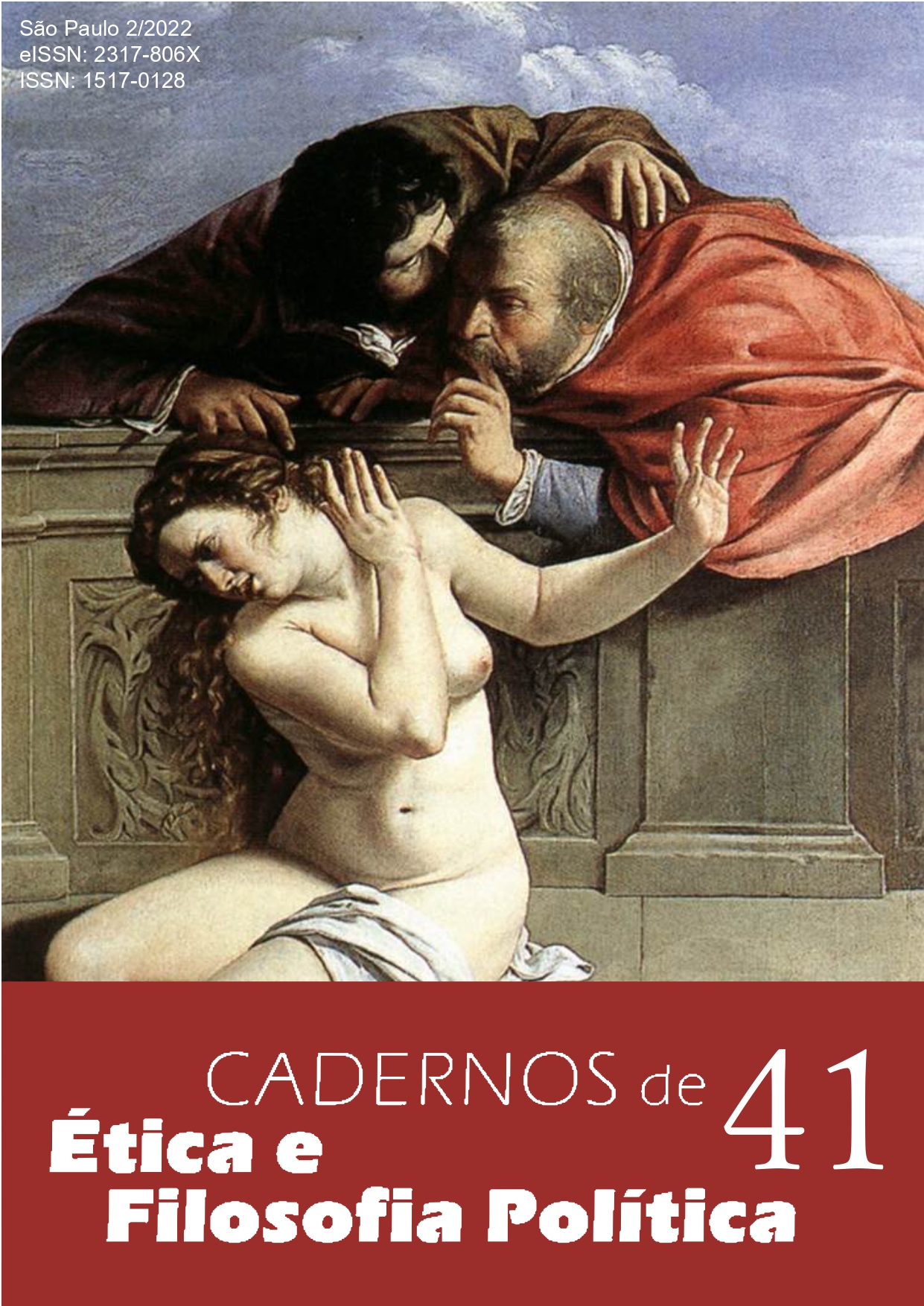Ethos e Self em três orações em defesa das mulheres no renascimento
DOI:
https://doi.org/10.11606/issn.1517-0128.v41i2p45-57Palavras-chave:
Moderata Fonte, Arcangela Tarabotti, Lorenzo Valla, Liberdade, Mulheres, RenascimentoResumo
É largamente reconhecido no interior dos estudos das Humanidades, em especial no campo da Filosofia, a lacuna deixada acerca da compreensão do papel das mulheres e da sua produção intelectual no pensamento filosófico. Tal preocupação deve-se, em grande parte, à produção divulgada por outras áreas de estudos, como as de gênero e da teoria feminista. No caso do campo filosófico, trata-se de reconhecer que a história da filosofia nunca foi feita só por homens, ainda mais quando se tratou da defesa da liberdade das mulheres e da sua luta por inserção e reconhecimento intelectuais. Neste sentido, este trabalho visa analisar comparativamente três discursos em defesa da liberdade das mulheres, escritos por duas jovens autoras e um autor, em momentos distintos. Em primeiro lugar, temos o discurso de um jovem professor de retórica, Lorenzo Valla, contido no seu diálogo Do Prazer, de 1431; em segundo, temos o diálogo Il Merito delle Donne, da escritora veneziana Moderata Fonte, publicado postumamente em 1600; e, por fim, o texto da Tirannia Paterna, de outra escritora veneziana, a filósofa Arcangela Tarabotti, publicado postumamente em 1654. Em todos os três casos, tratam-se de discursos endereçados aos homens, em repúdio por seus crimes cometidos contra a liberdade das mulheres e o livre-arbítrio em geral. Desse modo, tomando como eixo de análise a semelhança temática entre tais textos, será de nosso interesse observar a relação entre o ethos dos falantes com o self dos autores nessas três orações distintas, levando em consideração ainda o gênero de discurso, a audiência, os efeitos retóricos e o contexto em que as obras se inscreveram.
Downloads
Referências
BAUMLIN, James S., BAUMLIN, Tita French. Ethos: new essays in rhetorical and critical theory. Dallas: Southern Methodist University Press, 1994.
BRUNI, Leonardo. “De studiis et litteris liber/The Study of Literature”. In: Humanist Educational Treatises. Edited and translated by Craig W. Kallendorf, 92–125. Cambridge, MA: Harvard University Press, 2002.
COX, Virginia. MODERATA FONTE (1555-1592). In: Italian Women Writers (IWW). University of Chicago Library, 2004. Disponível em: https://www.lib.uchicago.edu/efts/IWW/BIOS/A0016.html Acesso em: 30 julho 2020.
COX, Virginia. Women’s Writings in Italy, 1400-1650. Baltimore: The Johns Hopkins University Press, 2008.
FINUCCI, Valeria. “La Scrittura Epico-Cavalleresca Al Femminile: Moderata Fonte e ‘Tredici Canti Del Floridoro.’” Annali D'Italianistica, vol. 12, 1994, pp. 203–231.
FONTE, Moderata. Il merito delle donne ove chiaramente si scuopre quanto siano elle degne e più perfette de gli uomini. Ed. Adriana Chemello. Venezia: Eidos, 1988.
FONTE, Moderata. The Worth of Women: Wherein is clearly revealed their nobility and their superiority to men. Edited and translated by Virginia Cox. Chicago: U of Chicago P, 1997.
HEITSCH, D.; VALLÉE, F-F. Printed Voices: the Renaissance Culture of Dialogue. Canada: University of Toronto Press, 2004.
KING, Margaret; RABIL, Albert Jr. Her Immaculate Hand: Selected Works by and about Women Humanistics of Quattrocento Italy. Binghamton, NY: Medieval and Renaissance Texts and Studies, 1983.
MANCINI, Girolamo. Vita di Lorenzo Valla, Firenze: Sansoni, 1891.
RAY, Meredith K. Writing gender in women's letter collections of the Italian Renaissance. Toronto: University of Toronto Press, 2009.
SLOANE, Thomas O. Donne, Milton, and the End of Humanist Rhetoric. Berkeley: University of California Press, 1985.
SWEARINGEN, Ethos: Imitation, Impersonation, And Voice. In: BAUMLIN, S., BAUMLIN, T. F. Ethos: new essays in rhetorical and critical theory. Dallas: Southern Methodist University Press, 1994.
TARABOTTI, A. Letters Familiar and Formal. Ed. and trans. Meredith K. Ray and Lynn Lara Westwater. Toronto: Iter, Centre for Reformation and Renaissance Studies, 2012.
TARABOTTI, Arcangela. L’Inferno Monalace, ed. Francesca Medioli. Turin: Rosenburg and Sellier, 1990.
TARABOTTI, Arcangela. La semplicità ingannata. A cura di S. Bortot. Padova: Il Poligrafo, 2007.
TARABOTTI, Arcangela. Paternal Tyranny. Edited and translated by Letizia Panizza. Chicago: University of Chicago Press, 2004.
VALLA, Lorenzo. “De Voluptate.”. In: ADAMI, A. L. O “De Voluptate” de Lorenzo Valla: tradução e notas, 2010. Dissertação (Mestrado em História), Faculdade de Filosofia, Letras e Ciências Humanas, Universidade de São Paulo, 2010.
WEAVER, Elissa. “With Truthful Tongue and Faithful Pen”: Arcangela Tarabotti Against Paternal Tyranny”. Annali d’Italianistica, vol. 34, 2016, pp. 281-296.
WEISNER, Merry E. Women and Gender in Early Modern Europe. Cambridge, UK: Cambridge University Press, 2000.
ZANETTE, Emilio. Suor Arcangela, monaca del Seicento veneziano. Venezia: Istituto per la Collaborazione Culturale, 1960.
Downloads
Publicado
Edição
Seção
Licença
Copyright (c) 2022 Ana Leticia Adami

Este trabalho está licenciado sob uma licença Creative Commons Attribution-ShareAlike 4.0 International License.


